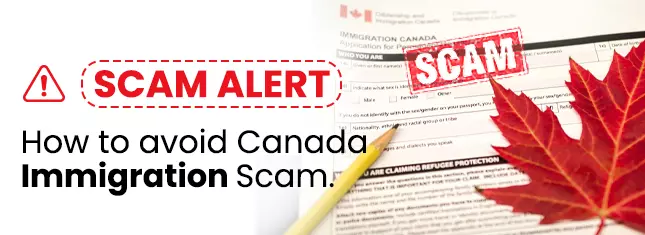
SCAM ALERT: How To Avoid Canada Immigration Scam?
Many people around the world have aspirations of moving to Canada. Canada is renowned for its open-door policy towards immigrants and offers a range of immigration programmes to meet the needs of various people. Canada has become a target for immigration scams or Canadian visa scams though, as a result of the success of its immigration programmes. We’ll go over what Canadian visa scams involving immigration to Canada are, how they work, and how to avoid Canadian visa scams in this blog.
Despite having a strong immigration system, there are unfortunately scammers who attempt to take advantage of people who are trying to immigrate to Canada. These scammers may solicit payment for unnecessary services or offer fraudulent immigration services.
What are Canada Immigration Scams?
The purpose of a Canada immigration scam is to trick people into thinking that they can quickly and easily immigrate to Canada. Scammers employ a variety of techniques, such as deceptive guarantees of immigration, fictitious job offers, and forged documents, to convince their victims into parting with money. Both domestically and abroad, these Canada Immigration frauds may be carried out.
How Do Canada Immigration Scams Work?
Scams involving immigration to Canada typically have the same structure.
- Firstly, the scammer contacts the victim typically via email or social media
- The scammer offers them a chance to immigrate to Canada.
- To make the offer seem more legitimate, they frequently use the name of an actual immigration consultant or government official.
- The victim is then required to pay a fee, which can be anywhere between a few hundred and several thousand
dollars, for the service.To give the impression that they are nearing immigration to Canada:- The scammer may give the victim fake documents like a job offer or a letter of invitation.
- Th scammer also gives false information about the immigration procedure, like they’ll expedite the application or assure its success.
- The scammer vanishes after the victim pays the fee, leaving the victim without any legal status or recourse.
Types of Canada Immigration Scams
Provincial Nominee Programs (PNPs) are legal ways for people to immigrate to Canada, but sadly, there are scammers who may try to sneak up on those who wish to immigrate via a PNP.These scammers might promote fraudulent immigration services or demand payment for unnecessary services. The scams in Canada immigration are on a rise and elaborated below are a few examples of immigration scams in Canada.
There are many types of Canadian immigration fraud or immigration scams in Canada, but some of the most common are:
- Phone /email Scams: Scammers contact individuals via phone or email and offer them the chance to immigrate to Canada. To give the offer more credibility, they might use the name of an actual immigration consultant or government official. They frequently demand money upfront and then disappear overnight.
- Scammers entice people with fake job offers by promising them a work permit and the chance to immigrate to Canada. They will demand payment in advance for services such as job placement or visa costs. In actuality, the victim is unemployed and lacks any sort of legal standing in Canada.
- Shadow consulting firms are unlicensed or dishonest immigration consultants who provide people with fraudulent immigration services. They frequently make promises to expedite the immigration process or guarantee success in their online advertisements. Although they will demand payment upfront, the services they offer are frequently subpar or fraudulent.
- Scammers prey on individuals looking to immigrate to Canada through marriage. For a fee, they offer to set up a marriage with a Canadian citizen. The marriage is fictitious, though, and the victim is without status in Canada.
- Fake Documents: Scammers trick people into giving them fake documents, including invitation letters, job offers, and diplomas. These documents might appear valid, but Canadian immigration officials frequently spot them.
- Fraudulent immigration consultants are people or businesses that promise to expedite the immigration process or guarantee application approval but frequently accept money without actually helping.
- Scams involving work permits or visas: These involve people or businesses that declare they can assist someone in getting a work permit or visa but demand money or personal information prior to actually disappearing.
- It’s critical to be aware of these scammers involved in Canadian immigration scams and to exercise caution whenever dealing with anyone who offers to help with Canadian immigration as it may be possible that you may fall prey to Canadian immigration scams. (1)
How to Avoid Canada Immigration Scams
So in this section, we will discuss how we can avoid Canada immigration scams along with the steps to identify immigration frauds. It’s also crucial to remember that PNPs have their own websites, so check one of the PNPs you’re interested in and look for the list of authorised representatives. It is equally important to note that the PNP has a specific website and that one should regularly check the PNP’s official website. A thorough list of authorised representatives can be found on the PNP website. (2)
It’s crucial to be watchful and do your homework to prevent falling for a Canada immigration scam. Here are some pointers to help you steer clear of immigration scams.:
- Use only authorised representatives: Verify the credentials of any immigration representatives you use by visiting the website of the Government of Canada.
- Unsolicited emails, phone calls, or text messages from people or businesses claiming to be able to help with Canadian immigration should be avoided.
- Be extremely cautious of promises: Be wary of anyone who promises to be able to guarantee that your immigration application will be approved.
- Paying upfront fees is not advisable. Avoid paying any upfront fees to anyone who offers to help you with your immigration application.
- Be extremely careful when disclosing personal information to people you don’t know or trust, such as your passport number or Social Security number.
For information on the immigration procedure, visit the Government of Canada’s official website. Be sure to read the instructions carefully and submit your application while keeping in mind the guidelines and requirements established by the nation and the immigration department. Visit the PNP’s official website: If you’re applying for PNP, check the PNP’s official website and look for the list of authorised representatives. Report any shady behaviour: Report the suspected fraud to the Canadian Anti-Fraud Centre if you believe you are a victim of an immigration scam.
You can help protect yourself from immigration scams and improve your chances of getting your application for Canadian immigration approved by heeding this advice and exercising caution. (3)
Here are some tips to avoid falling victim to Canada immigration scams:
Below mentioned are a few tips to avoid Canadian immigration scams.
- Collect information Make sure that any immigration consultant you hire is approved by the Immigration Consultants of Canada Regulatory Council before you hire them (ICCRC). The only organisation in Canada that regulates immigration consultants is the ICCRC.
- Look for ratings, online testimonials or reviews written by previous customers. Avoid the consultant or service provider if possible if they have a poor reputation.
- Be sceptical of promises, such as those of guaranteed immigration or accelerated processing times. A consultant or service provider for immigration cannot
Need Help At Your University?
Contact Us +91 93408 99870
TRANSCRIPTS AND ATTESTATION/VERIFICATION: The #1 Transcript Service Providers
Worldwide Transcripts Provides Your Transcript At Your Doorstep And Walk Through Every Step!
Conclusion
To sum up, it is crucial to exercise caution and vigilance when dealing with Canada’s express entry program in order to avoid becoming a victim of Canada immigration fraud. Scammers use a variety of strategies, such as false promises, fictitious job offers, and fraud schemes, to take advantage of unwary people trying to immigrate to Canada. It is advised to do thorough research, consult qualified immigration consultants or attorneys, and confirm the legitimacy of the programme or agency using official government channels in order to avoid falling victim to fraud. Additionally, it is crucial to avoid disclosing private data to unauthorised parties and report any suspicious activity immediately to the appropriate authorities. You can guard against falling victim to Canadian immigration scams by exercising caution and simply following this advice, and you can also accomplish your immigration goals.
FAQ's
What is an Immigration scam?
Immigration scams refer to fraudulent activities that aim to cheat candidates seeking immigration by making them believe that they will be able to immigrate to the nation easily and quickly.
How do I know if my immigration agency is genuine and trustworthy?
Any immigration agency providing immigration services will not offer immigration services or consultations without registration. For example, a Consultant offering Canadian immigration services needs to be registered with RCIC (Regulated Canadian Immigration Consultant) which is an authorised body governed by the Canadian Government.
How can I stay away from immigration scams in Canada?
Dealing with unofficial representatives of the Canadian government or immigration system puts you at risk for fraud. Additionally, you ought to exercise caution when dealing with anyone who offers to facilitate your immigration to Canada in exchange for a fee, particularly if they demand upfront payment or personal information.
How to report any Canada Immigration Scam?
Any immigration agency conducting fraudulent activity and cheating candidates should immediately report to should report the incident to the Canadian Anti-Fraud Centre (CAFC) or CBSA (Canada Border Services Agency) via call or mail which is the watchdog for any Canadian immigration irregularity.
Receiving a threat call from an unknown source who says they are calling from Canadian Immigration Department. Can it be a possible scam?
IRCC (Immigration, Refugees and Citizenship Canada) will never contact you in person, by mail or over the telephone to deposit charges or fines to avoid deportation or further legal consequences.
References
- “Canada Immigration fraud” – https://www.canada.ca/en/immigration-refugees-citizenship/services/protect-fraud.html
- “Fake immigration in Canada” – https://cgivancouver.gov.in/pdf/Queries_Fake_Employment%20_Immigration_in_Canada
- “Avoiding Immigration Scam” – https://www.legalline.ca/legal-answers/immigration-fraud/







